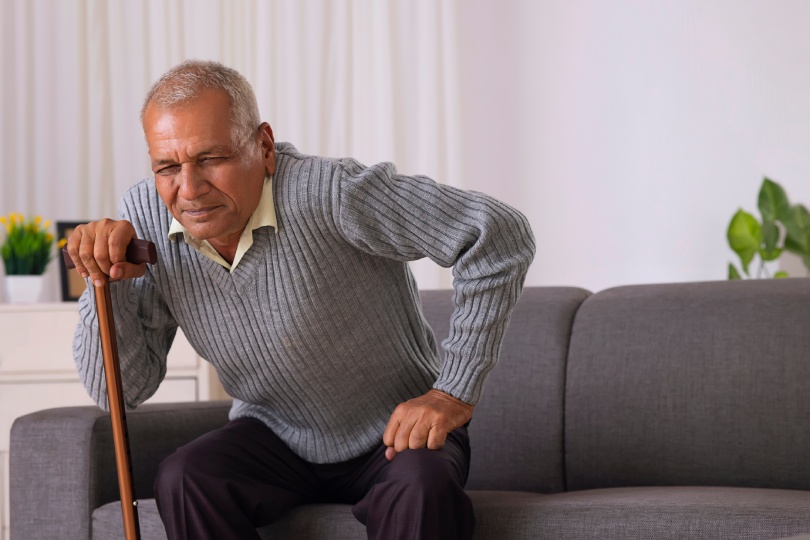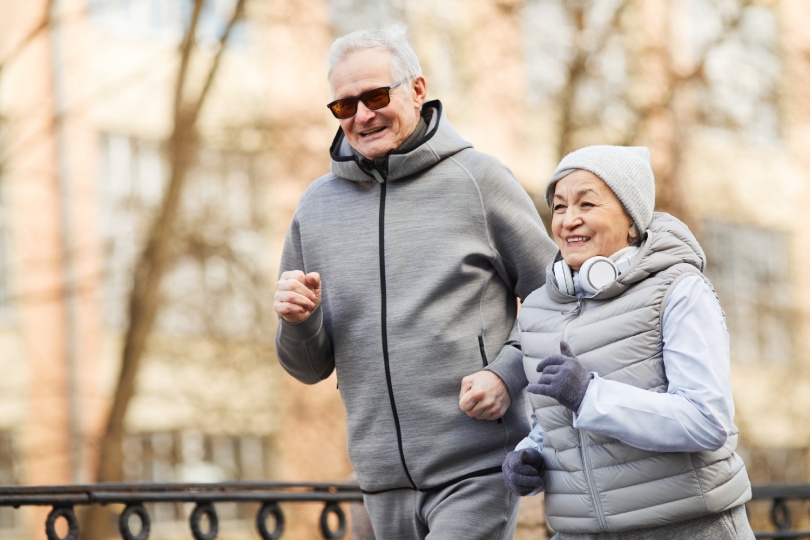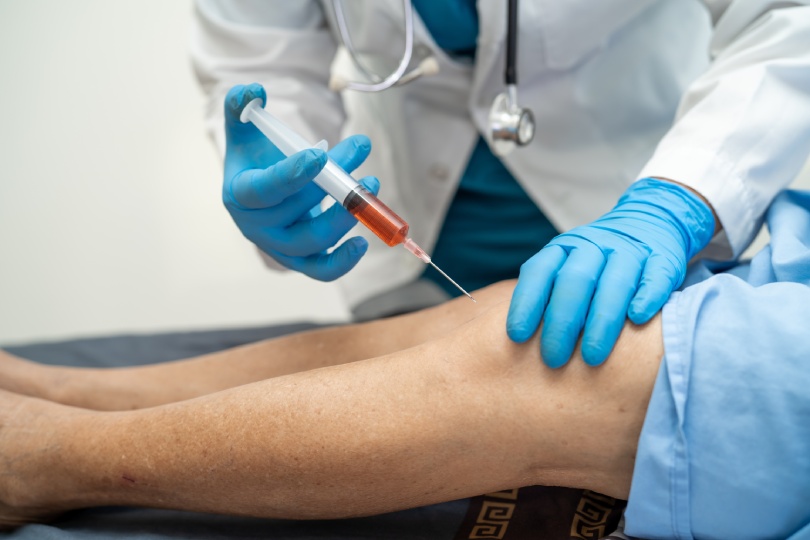7 Winter Pain Management Tips for Seniors
Cold weather significantly impacts joint pain and mobility, particularly in older adults. When temperatures drop and muscles tense up. Changes in barometric pressure can cause tendons, muscles, and surrounding tissues to expand, resulting in decreased mobility, stiffness, and pain.
Seniors are especially vulnerable to these effects due to several factors. Reduced blood flow to joints, a common issue in older adults, causes the stiffening of muscles and tendons around the joints, leading to soreness and a decreased range of motion. Wintry weather exacerbates conditions such as arthritis, rheumatoid arthritis, and fibromyalgia, making daily activities more challenging for seniors during winter. Effective pain management for seniors in cold weather is crucial to maintain their quality of life.

Understanding these mechanisms is not just informative; it is empowering. It is the first step in taking control of your health and developing effective strategies to manage cold-weather pain and maintain your quality of life throughout the winter season. Here are some other winter pain management tips for the RGV to keep your pain under control this winter.
Stay warm and cozy
Staying warm is crucial as cold temperatures can play a role in reducing joint flexibility and mobility. Dressing in layers helps trap heat and protect your body from the cold. Consider the following tips for warmth:
- Layer Smartly: Opt for thermal wear to keep the cold at bay.
- Protect Extremities: Warm gloves and socks can enhance circulation and ease stiffness.
- Embrace Heat: Use heated blankets or pads to soothe sore spots.
- Optimize Home Comfort: Keep your living space cozy with draft stoppers and efficient heating.
By prioritizing warmth, you can reduce discomfort and improve mobility during the winter.
Keep moving with gentle exercise

Physical activity is another key component of managing pain. Even in winter, regular movement helps reduce stiffness, improve circulation, and boost overall mood. Engaging in gentle exercises can make a significant difference. You don’t even have to exercise outside if the weather is bad. Here are some exercise ideas to consider:
- Indoor Activities: Engage in yoga or tai chi to maintain flexibility and strength.
- Safe Walking Spaces: Utilize malls or community centers for indoor walks.
- Virtual Fitness: Explore online classes tailored for seniors.
- Consistency: Aim for regular, moderate activity and listen to your body.
Staying active make sure that your joints remain flexible and your muscles strong, contributing to overall well-being.
Hydrate for health
Hydration is equally important, even when it’s cold outside. Dehydration can worsen muscle cramps and joint pain, so drinking enough is essential. Here are some hydration tips:
- Regular Water Intake: Make sure you are drinking enough, even in cooler weather. You can easily lose moisture even when you do not feel hot.
- Warm Hydration Options: Enjoy herbal teas or broths to stay hydrated in a way that is also comforting when you want to stay curled up and comfy.
- Mind Caffeine: Limit coffee to avoid dehydration. Caffeine is a diuretic, which can lead to dehydration if you consume large quantities of it.
By staying hydrated, you support your body’s natural functions and help prevent additional discomfort.
Nourish with a balanced diet
Embrace the power of nature with a diet rich in leafy greens, berries, nuts, and fatty fish, all known for their anti-inflammatory properties. These nutrient-packed foods not only help alleviate discomfort but also strengthen your immune system, boost energy levels, and enhance overall well-being. At Altus, we believe that integrating these foods into your diet is a crucial step in a holistic and comprehensive approach to managing chronic pain. Consider incorporating these dietary habits:
- Anti-Inflammatory Foods: Include omega-3-rich fish and colorful fruits and veggies.
- Avoid Processed Foods: Limit sugar and unhealthy fats to reduce inflammation.
- Consistent Meals: Maintain energy with regular, nutritious eating.
By nourishing your body with the right foods, you can enhance your body’s ability to manage pain.
Embrace mind-body practices
Discover the transformative power of mind-body practices like meditation, yoga, and deep breathing exercises in your journey to pain relief. At Altus, we understand that reducing stress is key to managing chronic pain, and these practices can enhance your overall well-being. By cultivating calm and mental clarity, you’re empowered to take control of your pain, integrating seamlessly into our holistic approach to care. These practices encourage relaxation and a positive mindset:
- Relaxation Techniques: Try meditation or deep breathing to ease stress.
- Guided Imagery: Visualize calming scenes to distract from discomfort.
- Mindfulness: Stay present and aware to improve your relationship with pain.
- Gentle Therapies: Consider massage or acupressure for tension relief.
Incorporating these techniques into your routine can help you manage pain more effectively.
Protect Your Skin and Joints
Additionally, taking care of your skin and joints is important during winter. Cold weather can dry out skin, leading to irritation, which can affect joint health. Here are some tips to protect your skin and joints:
- Moisturize: Keep skin hydrated to prevent dryness.
- Warm Soaks: Add Epsom salts to baths for muscle relief.
- Shield from Elements: Use scarves and hats outdoors.
- Supplement Smartly: Discuss vitamin D or fish oil with your doctor.
By maintaining healthy skin and joints, you can reduce discomfort and support your overall health.
Consult a pain expert

While lifestyle adjustments and home remedies can provide significant relief, some individuals may require more advanced pain management options to combat discomfort, especially during colder weather. For those seeking additional relief, a pain expert can provide the insights and innovative treatments that finally bring relief. Here are some of the innovative treatments that Altus offers though our pain specialists:
Regenexx®
Regenexx® is a non-surgical option that has emerged as an effective alternative for joint pain relief. This treatment uses the patient’s cells to promote healing and reduce inflammation, potentially offering long-lasting relief from winter joint pain.
Interventional Procedures
Certain procedures, such as nerve blocks, provide targeted relief for chronic pain sufferers. These minimally invasive treatments involve injections that block pain signals from specific nerves, offering almost instantaneous relief for various conditions, including lower back pain and joint discomfort.
At Altus, we’re dedicated to helping you navigate winter with ease and confidence. Remember, your well-being is our priority. For personalized support and advanced pain management solutions, reach out to us. Together, we can make this winter a season of comfort and joy.






